Mental Health Literature Review
VerifiedAdded on 2020/03/16
|13
|3246
|124
AI Summary
This assignment presents a collection of summaries for diverse research papers focusing on various aspects of mental health. The papers cover topics such as anxiety disorders, treatment methods, behavioral symptoms of dementia, HCV transmission prevention among people who inject drugs, and the utilization of antipsychotic medications in young individuals. The summary aims to provide a comprehensive overview of these studies within the field of mental health.
Contribute Materials
Your contribution can guide someone’s learning journey. Share your
documents today.
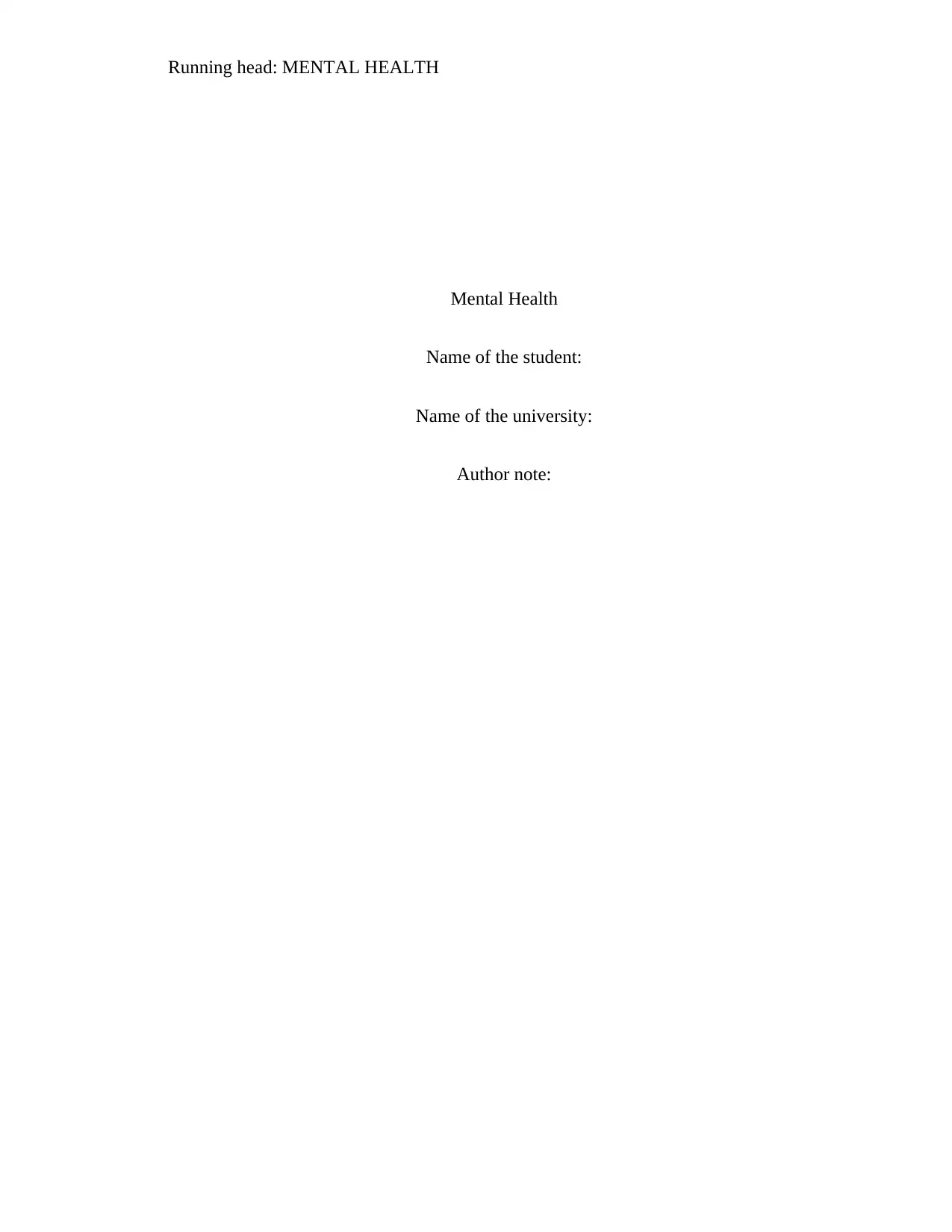
Running head: MENTAL HEALTH
Mental Health
Name of the student:
Name of the university:
Author note:
Mental Health
Name of the student:
Name of the university:
Author note:
Secure Best Marks with AI Grader
Need help grading? Try our AI Grader for instant feedback on your assignments.
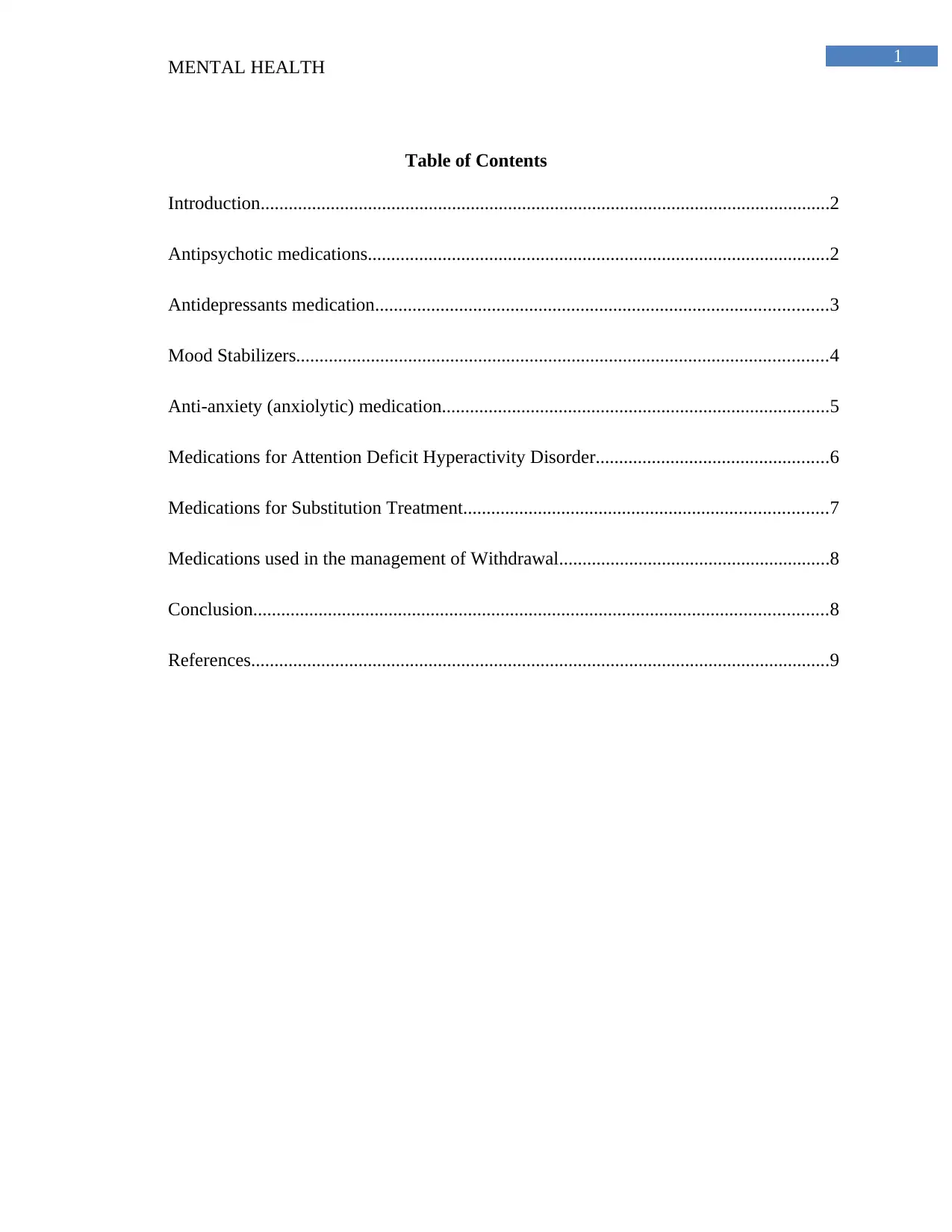
1
MENTAL HEALTH
Table of Contents
Introduction..........................................................................................................................2
Antipsychotic medications...................................................................................................2
Antidepressants medication.................................................................................................3
Mood Stabilizers..................................................................................................................4
Anti-anxiety (anxiolytic) medication...................................................................................5
Medications for Attention Deficit Hyperactivity Disorder..................................................6
Medications for Substitution Treatment..............................................................................7
Medications used in the management of Withdrawal..........................................................8
Conclusion...........................................................................................................................8
References............................................................................................................................9
MENTAL HEALTH
Table of Contents
Introduction..........................................................................................................................2
Antipsychotic medications...................................................................................................2
Antidepressants medication.................................................................................................3
Mood Stabilizers..................................................................................................................4
Anti-anxiety (anxiolytic) medication...................................................................................5
Medications for Attention Deficit Hyperactivity Disorder..................................................6
Medications for Substitution Treatment..............................................................................7
Medications used in the management of Withdrawal..........................................................8
Conclusion...........................................................................................................................8
References............................................................................................................................9
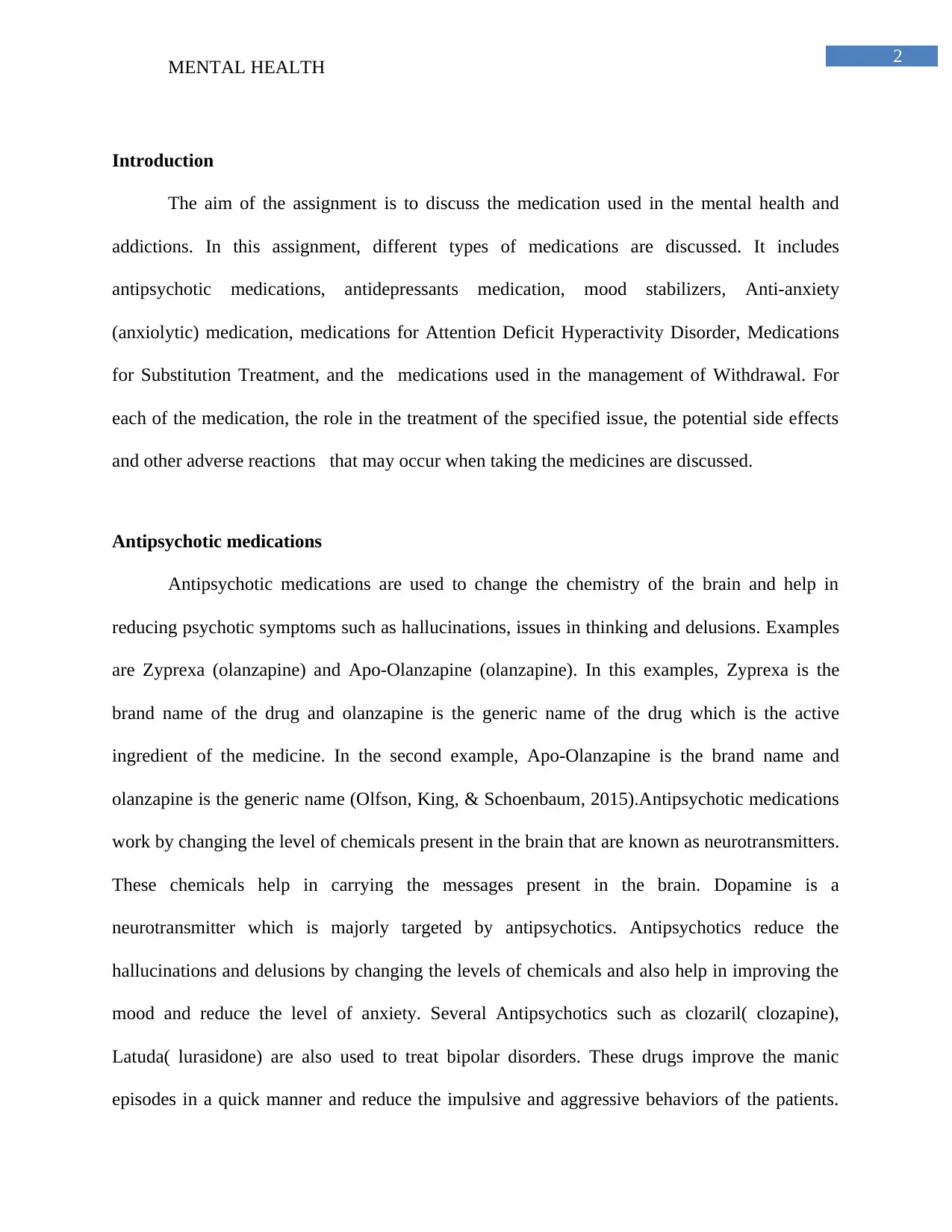
2
MENTAL HEALTH
Introduction
The aim of the assignment is to discuss the medication used in the mental health and
addictions. In this assignment, different types of medications are discussed. It includes
antipsychotic medications, antidepressants medication, mood stabilizers, Anti-anxiety
(anxiolytic) medication, medications for Attention Deficit Hyperactivity Disorder, Medications
for Substitution Treatment, and the medications used in the management of Withdrawal. For
each of the medication, the role in the treatment of the specified issue, the potential side effects
and other adverse reactions that may occur when taking the medicines are discussed.
Antipsychotic medications
Antipsychotic medications are used to change the chemistry of the brain and help in
reducing psychotic symptoms such as hallucinations, issues in thinking and delusions. Examples
are Zyprexa (olanzapine) and Apo-Olanzapine (olanzapine). In this examples, Zyprexa is the
brand name of the drug and olanzapine is the generic name of the drug which is the active
ingredient of the medicine. In the second example, Apo-Olanzapine is the brand name and
olanzapine is the generic name (Olfson, King, & Schoenbaum, 2015).Antipsychotic medications
work by changing the level of chemicals present in the brain that are known as neurotransmitters.
These chemicals help in carrying the messages present in the brain. Dopamine is a
neurotransmitter which is majorly targeted by antipsychotics. Antipsychotics reduce the
hallucinations and delusions by changing the levels of chemicals and also help in improving the
mood and reduce the level of anxiety. Several Antipsychotics such as clozaril( clozapine),
Latuda( lurasidone) are also used to treat bipolar disorders. These drugs improve the manic
episodes in a quick manner and reduce the impulsive and aggressive behaviors of the patients.
MENTAL HEALTH
Introduction
The aim of the assignment is to discuss the medication used in the mental health and
addictions. In this assignment, different types of medications are discussed. It includes
antipsychotic medications, antidepressants medication, mood stabilizers, Anti-anxiety
(anxiolytic) medication, medications for Attention Deficit Hyperactivity Disorder, Medications
for Substitution Treatment, and the medications used in the management of Withdrawal. For
each of the medication, the role in the treatment of the specified issue, the potential side effects
and other adverse reactions that may occur when taking the medicines are discussed.
Antipsychotic medications
Antipsychotic medications are used to change the chemistry of the brain and help in
reducing psychotic symptoms such as hallucinations, issues in thinking and delusions. Examples
are Zyprexa (olanzapine) and Apo-Olanzapine (olanzapine). In this examples, Zyprexa is the
brand name of the drug and olanzapine is the generic name of the drug which is the active
ingredient of the medicine. In the second example, Apo-Olanzapine is the brand name and
olanzapine is the generic name (Olfson, King, & Schoenbaum, 2015).Antipsychotic medications
work by changing the level of chemicals present in the brain that are known as neurotransmitters.
These chemicals help in carrying the messages present in the brain. Dopamine is a
neurotransmitter which is majorly targeted by antipsychotics. Antipsychotics reduce the
hallucinations and delusions by changing the levels of chemicals and also help in improving the
mood and reduce the level of anxiety. Several Antipsychotics such as clozaril( clozapine),
Latuda( lurasidone) are also used to treat bipolar disorders. These drugs improve the manic
episodes in a quick manner and reduce the impulsive and aggressive behaviors of the patients.
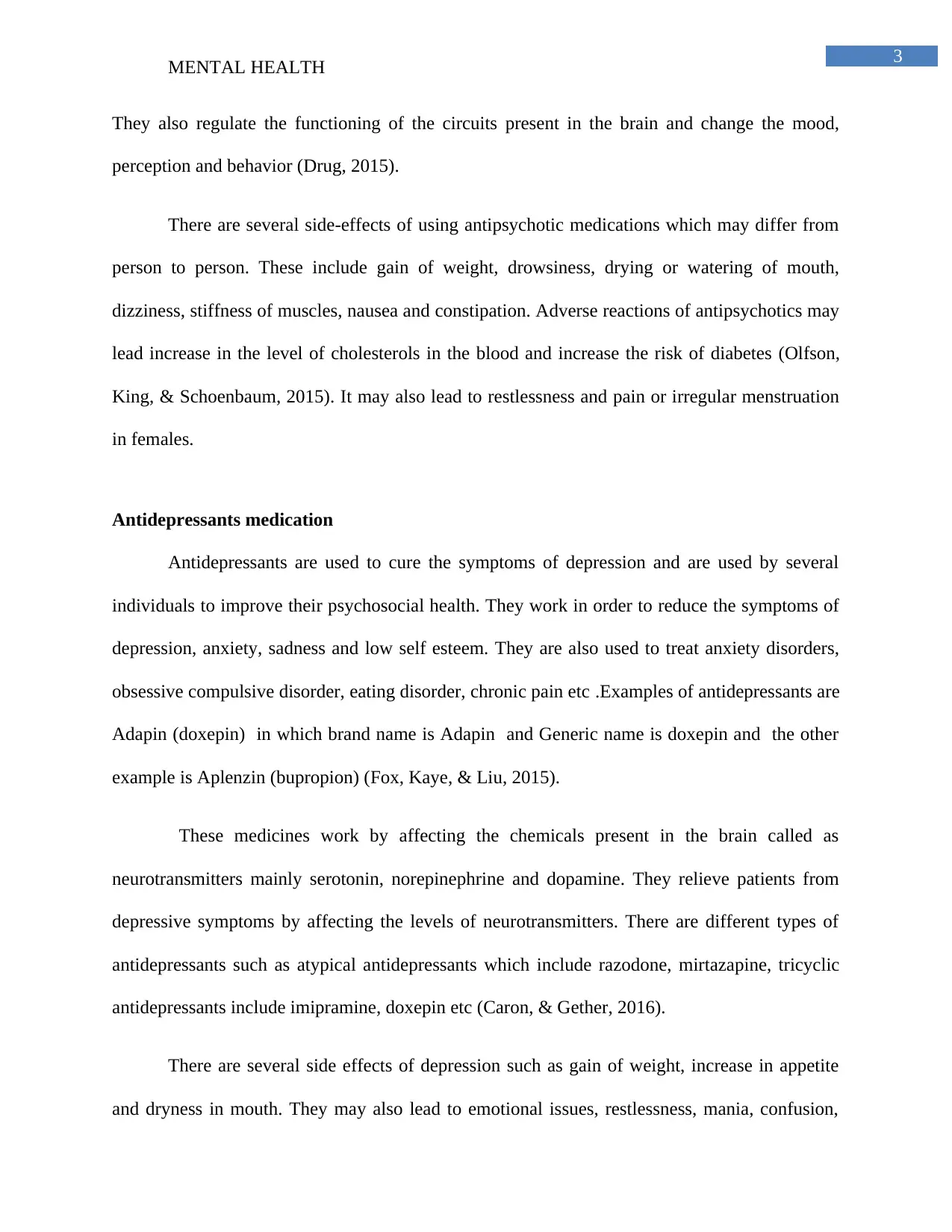
3
MENTAL HEALTH
They also regulate the functioning of the circuits present in the brain and change the mood,
perception and behavior (Drug, 2015).
There are several side-effects of using antipsychotic medications which may differ from
person to person. These include gain of weight, drowsiness, drying or watering of mouth,
dizziness, stiffness of muscles, nausea and constipation. Adverse reactions of antipsychotics may
lead increase in the level of cholesterols in the blood and increase the risk of diabetes (Olfson,
King, & Schoenbaum, 2015). It may also lead to restlessness and pain or irregular menstruation
in females.
Antidepressants medication
Antidepressants are used to cure the symptoms of depression and are used by several
individuals to improve their psychosocial health. They work in order to reduce the symptoms of
depression, anxiety, sadness and low self esteem. They are also used to treat anxiety disorders,
obsessive compulsive disorder, eating disorder, chronic pain etc .Examples of antidepressants are
Adapin (doxepin) in which brand name is Adapin and Generic name is doxepin and the other
example is Aplenzin (bupropion) (Fox, Kaye, & Liu, 2015).
These medicines work by affecting the chemicals present in the brain called as
neurotransmitters mainly serotonin, norepinephrine and dopamine. They relieve patients from
depressive symptoms by affecting the levels of neurotransmitters. There are different types of
antidepressants such as atypical antidepressants which include razodone, mirtazapine, tricyclic
antidepressants include imipramine, doxepin etc (Caron, & Gether, 2016).
There are several side effects of depression such as gain of weight, increase in appetite
and dryness in mouth. They may also lead to emotional issues, restlessness, mania, confusion,
MENTAL HEALTH
They also regulate the functioning of the circuits present in the brain and change the mood,
perception and behavior (Drug, 2015).
There are several side-effects of using antipsychotic medications which may differ from
person to person. These include gain of weight, drowsiness, drying or watering of mouth,
dizziness, stiffness of muscles, nausea and constipation. Adverse reactions of antipsychotics may
lead increase in the level of cholesterols in the blood and increase the risk of diabetes (Olfson,
King, & Schoenbaum, 2015). It may also lead to restlessness and pain or irregular menstruation
in females.
Antidepressants medication
Antidepressants are used to cure the symptoms of depression and are used by several
individuals to improve their psychosocial health. They work in order to reduce the symptoms of
depression, anxiety, sadness and low self esteem. They are also used to treat anxiety disorders,
obsessive compulsive disorder, eating disorder, chronic pain etc .Examples of antidepressants are
Adapin (doxepin) in which brand name is Adapin and Generic name is doxepin and the other
example is Aplenzin (bupropion) (Fox, Kaye, & Liu, 2015).
These medicines work by affecting the chemicals present in the brain called as
neurotransmitters mainly serotonin, norepinephrine and dopamine. They relieve patients from
depressive symptoms by affecting the levels of neurotransmitters. There are different types of
antidepressants such as atypical antidepressants which include razodone, mirtazapine, tricyclic
antidepressants include imipramine, doxepin etc (Caron, & Gether, 2016).
There are several side effects of depression such as gain of weight, increase in appetite
and dryness in mouth. They may also lead to emotional issues, restlessness, mania, confusion,
Paraphrase This Document
Need a fresh take? Get an instant paraphrase of this document with our AI Paraphraser
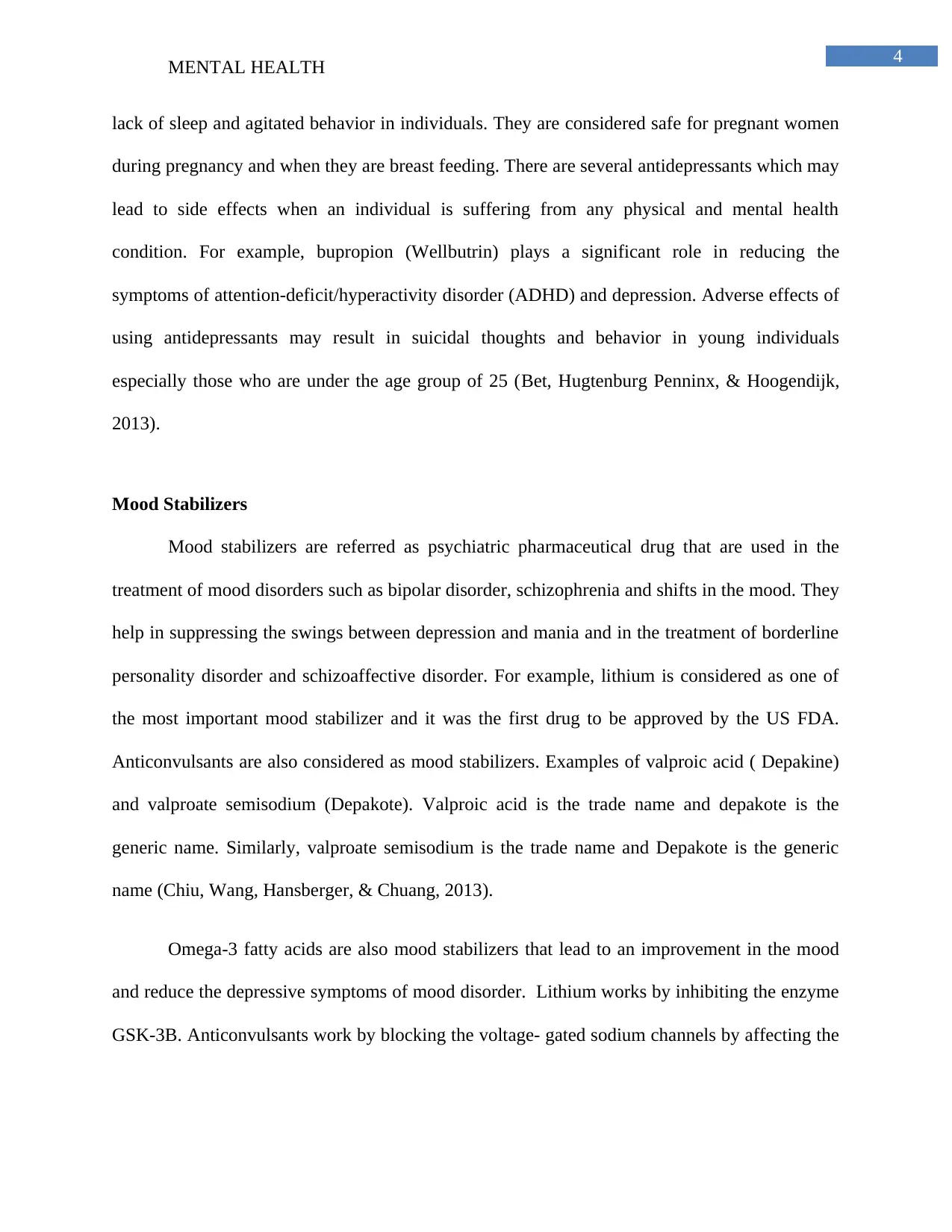
4
MENTAL HEALTH
lack of sleep and agitated behavior in individuals. They are considered safe for pregnant women
during pregnancy and when they are breast feeding. There are several antidepressants which may
lead to side effects when an individual is suffering from any physical and mental health
condition. For example, bupropion (Wellbutrin) plays a significant role in reducing the
symptoms of attention-deficit/hyperactivity disorder (ADHD) and depression. Adverse effects of
using antidepressants may result in suicidal thoughts and behavior in young individuals
especially those who are under the age group of 25 (Bet, Hugtenburg Penninx, & Hoogendijk,
2013).
Mood Stabilizers
Mood stabilizers are referred as psychiatric pharmaceutical drug that are used in the
treatment of mood disorders such as bipolar disorder, schizophrenia and shifts in the mood. They
help in suppressing the swings between depression and mania and in the treatment of borderline
personality disorder and schizoaffective disorder. For example, lithium is considered as one of
the most important mood stabilizer and it was the first drug to be approved by the US FDA.
Anticonvulsants are also considered as mood stabilizers. Examples of valproic acid ( Depakine)
and valproate semisodium (Depakote). Valproic acid is the trade name and depakote is the
generic name. Similarly, valproate semisodium is the trade name and Depakote is the generic
name (Chiu, Wang, Hansberger, & Chuang, 2013).
Omega-3 fatty acids are also mood stabilizers that lead to an improvement in the mood
and reduce the depressive symptoms of mood disorder. Lithium works by inhibiting the enzyme
GSK-3B. Anticonvulsants work by blocking the voltage- gated sodium channels by affecting the
MENTAL HEALTH
lack of sleep and agitated behavior in individuals. They are considered safe for pregnant women
during pregnancy and when they are breast feeding. There are several antidepressants which may
lead to side effects when an individual is suffering from any physical and mental health
condition. For example, bupropion (Wellbutrin) plays a significant role in reducing the
symptoms of attention-deficit/hyperactivity disorder (ADHD) and depression. Adverse effects of
using antidepressants may result in suicidal thoughts and behavior in young individuals
especially those who are under the age group of 25 (Bet, Hugtenburg Penninx, & Hoogendijk,
2013).
Mood Stabilizers
Mood stabilizers are referred as psychiatric pharmaceutical drug that are used in the
treatment of mood disorders such as bipolar disorder, schizophrenia and shifts in the mood. They
help in suppressing the swings between depression and mania and in the treatment of borderline
personality disorder and schizoaffective disorder. For example, lithium is considered as one of
the most important mood stabilizer and it was the first drug to be approved by the US FDA.
Anticonvulsants are also considered as mood stabilizers. Examples of valproic acid ( Depakine)
and valproate semisodium (Depakote). Valproic acid is the trade name and depakote is the
generic name. Similarly, valproate semisodium is the trade name and Depakote is the generic
name (Chiu, Wang, Hansberger, & Chuang, 2013).
Omega-3 fatty acids are also mood stabilizers that lead to an improvement in the mood
and reduce the depressive symptoms of mood disorder. Lithium works by inhibiting the enzyme
GSK-3B. Anticonvulsants work by blocking the voltage- gated sodium channels by affecting the
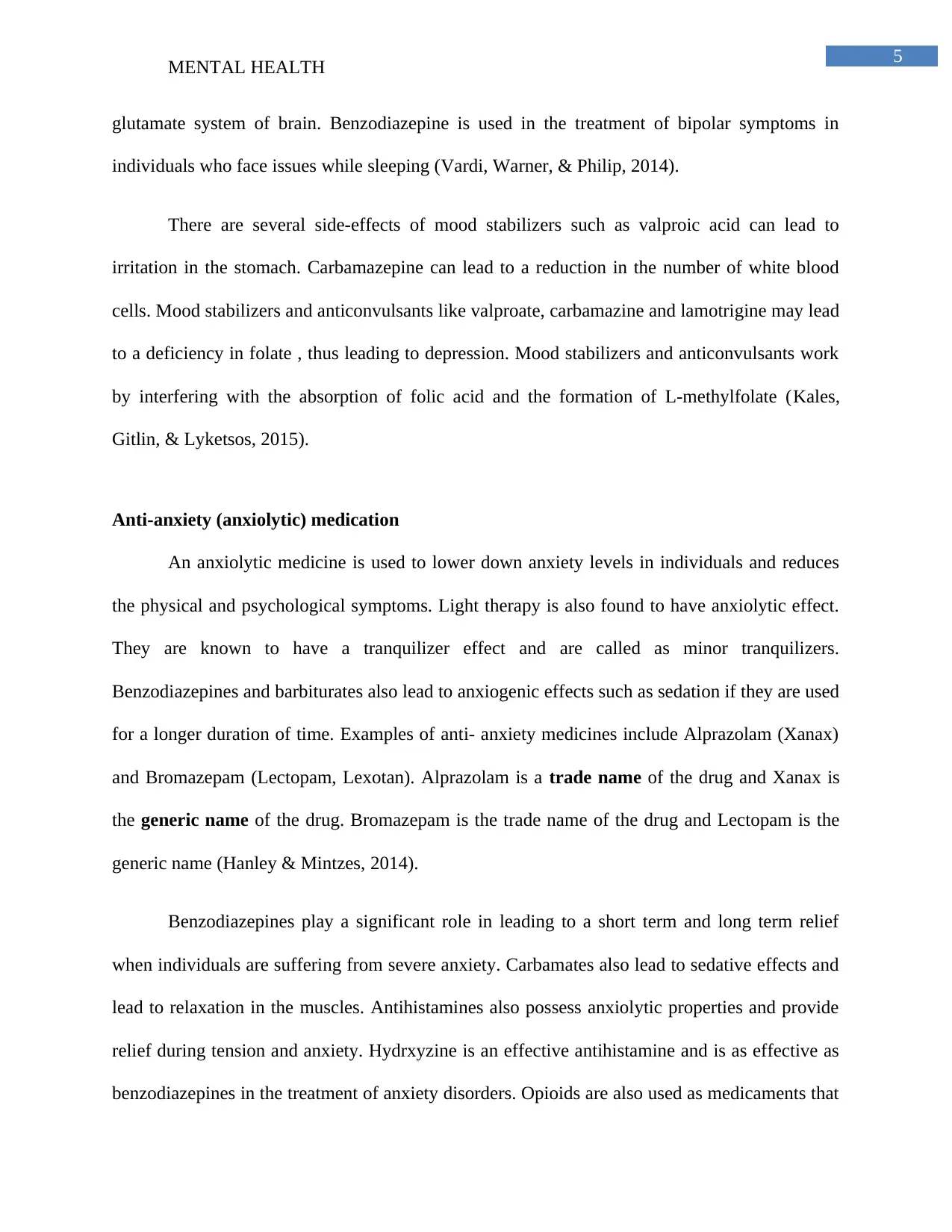
5
MENTAL HEALTH
glutamate system of brain. Benzodiazepine is used in the treatment of bipolar symptoms in
individuals who face issues while sleeping (Vardi, Warner, & Philip, 2014).
There are several side-effects of mood stabilizers such as valproic acid can lead to
irritation in the stomach. Carbamazepine can lead to a reduction in the number of white blood
cells. Mood stabilizers and anticonvulsants like valproate, carbamazine and lamotrigine may lead
to a deficiency in folate , thus leading to depression. Mood stabilizers and anticonvulsants work
by interfering with the absorption of folic acid and the formation of L-methylfolate (Kales,
Gitlin, & Lyketsos, 2015).
Anti-anxiety (anxiolytic) medication
An anxiolytic medicine is used to lower down anxiety levels in individuals and reduces
the physical and psychological symptoms. Light therapy is also found to have anxiolytic effect.
They are known to have a tranquilizer effect and are called as minor tranquilizers.
Benzodiazepines and barbiturates also lead to anxiogenic effects such as sedation if they are used
for a longer duration of time. Examples of anti- anxiety medicines include Alprazolam (Xanax)
and Bromazepam (Lectopam, Lexotan). Alprazolam is a trade name of the drug and Xanax is
the generic name of the drug. Bromazepam is the trade name of the drug and Lectopam is the
generic name (Hanley & Mintzes, 2014).
Benzodiazepines play a significant role in leading to a short term and long term relief
when individuals are suffering from severe anxiety. Carbamates also lead to sedative effects and
lead to relaxation in the muscles. Antihistamines also possess anxiolytic properties and provide
relief during tension and anxiety. Hydrxyzine is an effective antihistamine and is as effective as
benzodiazepines in the treatment of anxiety disorders. Opioids are also used as medicaments that
MENTAL HEALTH
glutamate system of brain. Benzodiazepine is used in the treatment of bipolar symptoms in
individuals who face issues while sleeping (Vardi, Warner, & Philip, 2014).
There are several side-effects of mood stabilizers such as valproic acid can lead to
irritation in the stomach. Carbamazepine can lead to a reduction in the number of white blood
cells. Mood stabilizers and anticonvulsants like valproate, carbamazine and lamotrigine may lead
to a deficiency in folate , thus leading to depression. Mood stabilizers and anticonvulsants work
by interfering with the absorption of folic acid and the formation of L-methylfolate (Kales,
Gitlin, & Lyketsos, 2015).
Anti-anxiety (anxiolytic) medication
An anxiolytic medicine is used to lower down anxiety levels in individuals and reduces
the physical and psychological symptoms. Light therapy is also found to have anxiolytic effect.
They are known to have a tranquilizer effect and are called as minor tranquilizers.
Benzodiazepines and barbiturates also lead to anxiogenic effects such as sedation if they are used
for a longer duration of time. Examples of anti- anxiety medicines include Alprazolam (Xanax)
and Bromazepam (Lectopam, Lexotan). Alprazolam is a trade name of the drug and Xanax is
the generic name of the drug. Bromazepam is the trade name of the drug and Lectopam is the
generic name (Hanley & Mintzes, 2014).
Benzodiazepines play a significant role in leading to a short term and long term relief
when individuals are suffering from severe anxiety. Carbamates also lead to sedative effects and
lead to relaxation in the muscles. Antihistamines also possess anxiolytic properties and provide
relief during tension and anxiety. Hydrxyzine is an effective antihistamine and is as effective as
benzodiazepines in the treatment of anxiety disorders. Opioids are also used as medicaments that
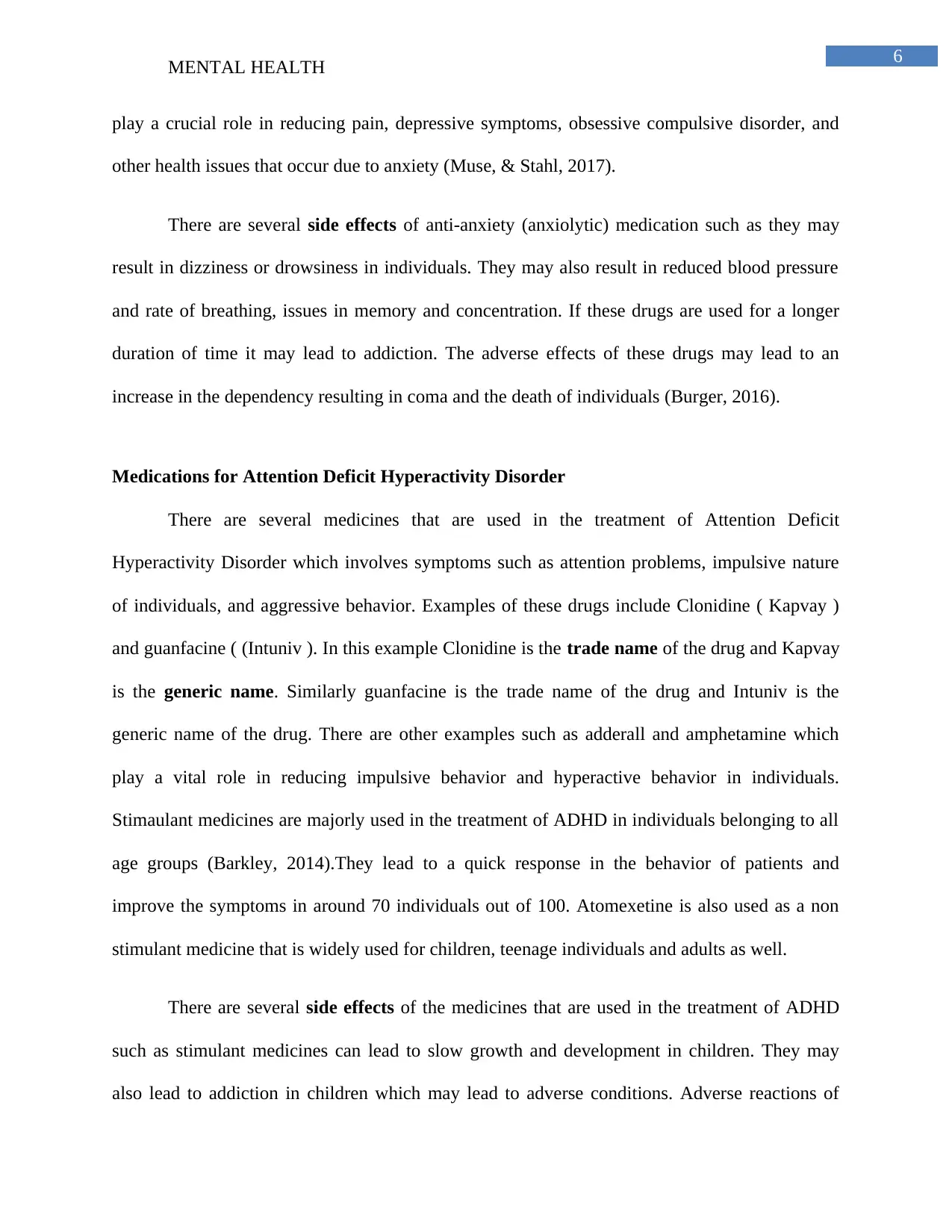
6
MENTAL HEALTH
play a crucial role in reducing pain, depressive symptoms, obsessive compulsive disorder, and
other health issues that occur due to anxiety (Muse, & Stahl, 2017).
There are several side effects of anti-anxiety (anxiolytic) medication such as they may
result in dizziness or drowsiness in individuals. They may also result in reduced blood pressure
and rate of breathing, issues in memory and concentration. If these drugs are used for a longer
duration of time it may lead to addiction. The adverse effects of these drugs may lead to an
increase in the dependency resulting in coma and the death of individuals (Burger, 2016).
Medications for Attention Deficit Hyperactivity Disorder
There are several medicines that are used in the treatment of Attention Deficit
Hyperactivity Disorder which involves symptoms such as attention problems, impulsive nature
of individuals, and aggressive behavior. Examples of these drugs include Clonidine ( Kapvay )
and guanfacine ( (Intuniv ). In this example Clonidine is the trade name of the drug and Kapvay
is the generic name. Similarly guanfacine is the trade name of the drug and Intuniv is the
generic name of the drug. There are other examples such as adderall and amphetamine which
play a vital role in reducing impulsive behavior and hyperactive behavior in individuals.
Stimaulant medicines are majorly used in the treatment of ADHD in individuals belonging to all
age groups (Barkley, 2014).They lead to a quick response in the behavior of patients and
improve the symptoms in around 70 individuals out of 100. Atomexetine is also used as a non
stimulant medicine that is widely used for children, teenage individuals and adults as well.
There are several side effects of the medicines that are used in the treatment of ADHD
such as stimulant medicines can lead to slow growth and development in children. They may
also lead to addiction in children which may lead to adverse conditions. Adverse reactions of
MENTAL HEALTH
play a crucial role in reducing pain, depressive symptoms, obsessive compulsive disorder, and
other health issues that occur due to anxiety (Muse, & Stahl, 2017).
There are several side effects of anti-anxiety (anxiolytic) medication such as they may
result in dizziness or drowsiness in individuals. They may also result in reduced blood pressure
and rate of breathing, issues in memory and concentration. If these drugs are used for a longer
duration of time it may lead to addiction. The adverse effects of these drugs may lead to an
increase in the dependency resulting in coma and the death of individuals (Burger, 2016).
Medications for Attention Deficit Hyperactivity Disorder
There are several medicines that are used in the treatment of Attention Deficit
Hyperactivity Disorder which involves symptoms such as attention problems, impulsive nature
of individuals, and aggressive behavior. Examples of these drugs include Clonidine ( Kapvay )
and guanfacine ( (Intuniv ). In this example Clonidine is the trade name of the drug and Kapvay
is the generic name. Similarly guanfacine is the trade name of the drug and Intuniv is the
generic name of the drug. There are other examples such as adderall and amphetamine which
play a vital role in reducing impulsive behavior and hyperactive behavior in individuals.
Stimaulant medicines are majorly used in the treatment of ADHD in individuals belonging to all
age groups (Barkley, 2014).They lead to a quick response in the behavior of patients and
improve the symptoms in around 70 individuals out of 100. Atomexetine is also used as a non
stimulant medicine that is widely used for children, teenage individuals and adults as well.
There are several side effects of the medicines that are used in the treatment of ADHD
such as stimulant medicines can lead to slow growth and development in children. They may
also lead to addiction in children which may lead to adverse conditions. Adverse reactions of
Secure Best Marks with AI Grader
Need help grading? Try our AI Grader for instant feedback on your assignments.
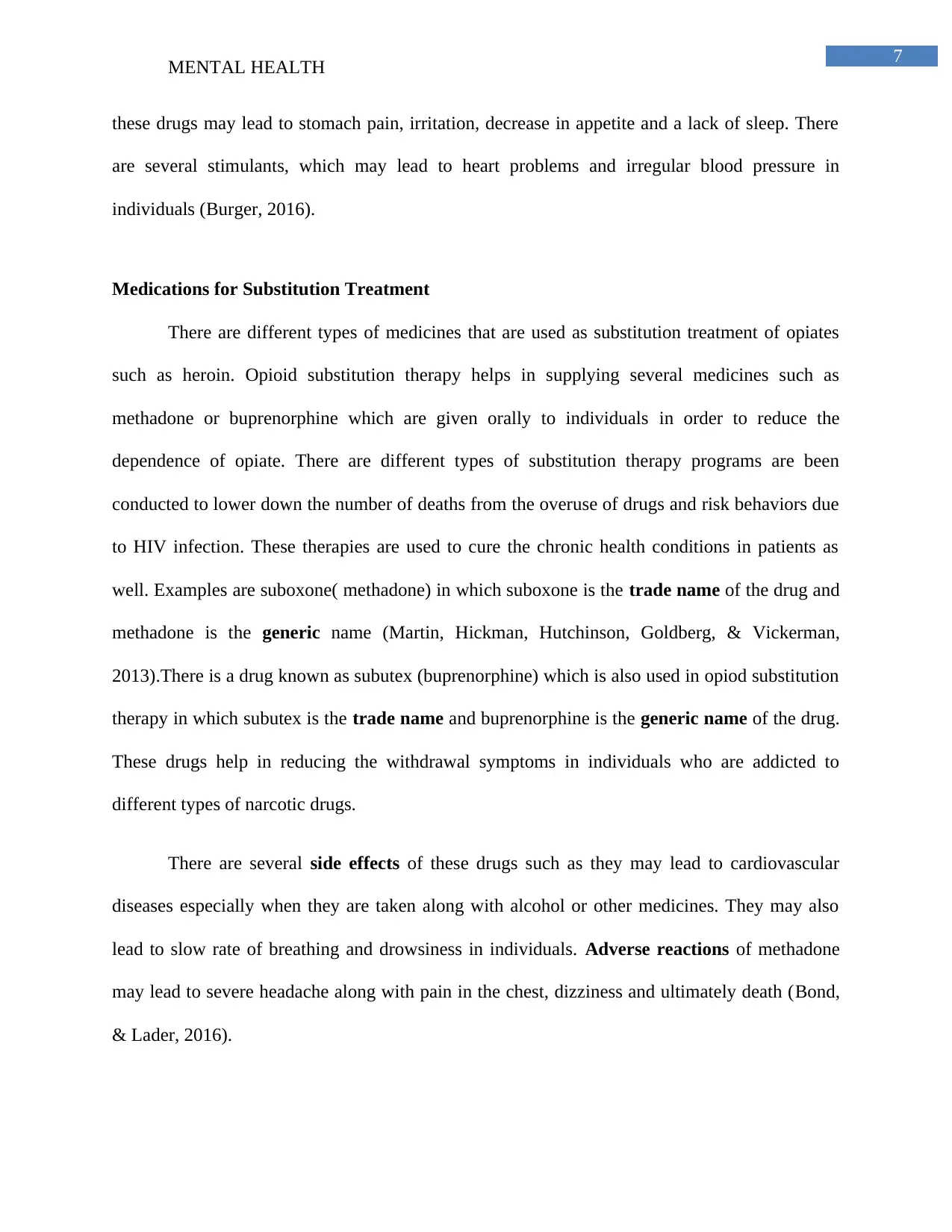
7
MENTAL HEALTH
these drugs may lead to stomach pain, irritation, decrease in appetite and a lack of sleep. There
are several stimulants, which may lead to heart problems and irregular blood pressure in
individuals (Burger, 2016).
Medications for Substitution Treatment
There are different types of medicines that are used as substitution treatment of opiates
such as heroin. Opioid substitution therapy helps in supplying several medicines such as
methadone or buprenorphine which are given orally to individuals in order to reduce the
dependence of opiate. There are different types of substitution therapy programs are been
conducted to lower down the number of deaths from the overuse of drugs and risk behaviors due
to HIV infection. These therapies are used to cure the chronic health conditions in patients as
well. Examples are suboxone( methadone) in which suboxone is the trade name of the drug and
methadone is the generic name (Martin, Hickman, Hutchinson, Goldberg, & Vickerman,
2013).There is a drug known as subutex (buprenorphine) which is also used in opiod substitution
therapy in which subutex is the trade name and buprenorphine is the generic name of the drug.
These drugs help in reducing the withdrawal symptoms in individuals who are addicted to
different types of narcotic drugs.
There are several side effects of these drugs such as they may lead to cardiovascular
diseases especially when they are taken along with alcohol or other medicines. They may also
lead to slow rate of breathing and drowsiness in individuals. Adverse reactions of methadone
may lead to severe headache along with pain in the chest, dizziness and ultimately death (Bond,
& Lader, 2016).
MENTAL HEALTH
these drugs may lead to stomach pain, irritation, decrease in appetite and a lack of sleep. There
are several stimulants, which may lead to heart problems and irregular blood pressure in
individuals (Burger, 2016).
Medications for Substitution Treatment
There are different types of medicines that are used as substitution treatment of opiates
such as heroin. Opioid substitution therapy helps in supplying several medicines such as
methadone or buprenorphine which are given orally to individuals in order to reduce the
dependence of opiate. There are different types of substitution therapy programs are been
conducted to lower down the number of deaths from the overuse of drugs and risk behaviors due
to HIV infection. These therapies are used to cure the chronic health conditions in patients as
well. Examples are suboxone( methadone) in which suboxone is the trade name of the drug and
methadone is the generic name (Martin, Hickman, Hutchinson, Goldberg, & Vickerman,
2013).There is a drug known as subutex (buprenorphine) which is also used in opiod substitution
therapy in which subutex is the trade name and buprenorphine is the generic name of the drug.
These drugs help in reducing the withdrawal symptoms in individuals who are addicted to
different types of narcotic drugs.
There are several side effects of these drugs such as they may lead to cardiovascular
diseases especially when they are taken along with alcohol or other medicines. They may also
lead to slow rate of breathing and drowsiness in individuals. Adverse reactions of methadone
may lead to severe headache along with pain in the chest, dizziness and ultimately death (Bond,
& Lader, 2016).
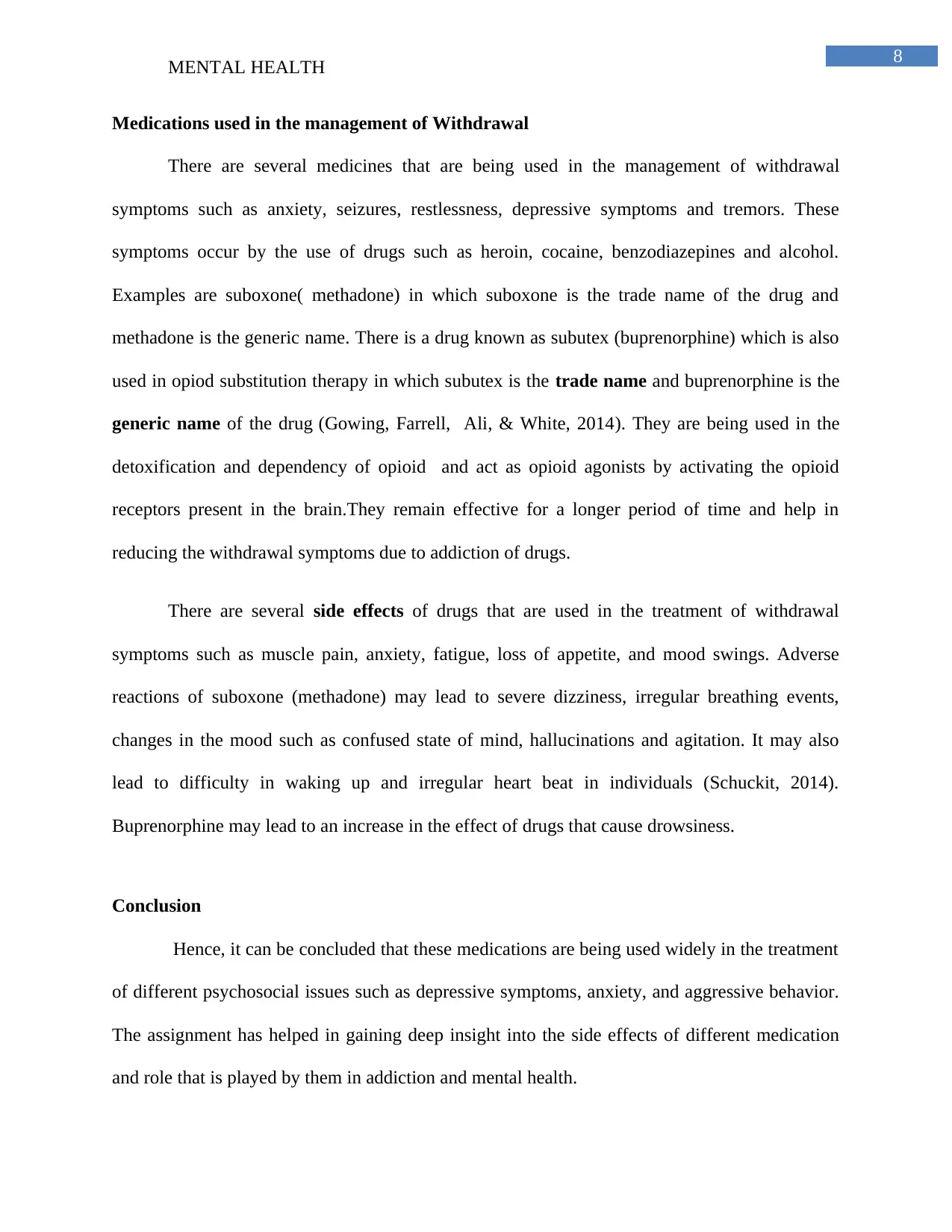
8
MENTAL HEALTH
Medications used in the management of Withdrawal
There are several medicines that are being used in the management of withdrawal
symptoms such as anxiety, seizures, restlessness, depressive symptoms and tremors. These
symptoms occur by the use of drugs such as heroin, cocaine, benzodiazepines and alcohol.
Examples are suboxone( methadone) in which suboxone is the trade name of the drug and
methadone is the generic name. There is a drug known as subutex (buprenorphine) which is also
used in opiod substitution therapy in which subutex is the trade name and buprenorphine is the
generic name of the drug (Gowing, Farrell, Ali, & White, 2014). They are being used in the
detoxification and dependency of opioid and act as opioid agonists by activating the opioid
receptors present in the brain.They remain effective for a longer period of time and help in
reducing the withdrawal symptoms due to addiction of drugs.
There are several side effects of drugs that are used in the treatment of withdrawal
symptoms such as muscle pain, anxiety, fatigue, loss of appetite, and mood swings. Adverse
reactions of suboxone (methadone) may lead to severe dizziness, irregular breathing events,
changes in the mood such as confused state of mind, hallucinations and agitation. It may also
lead to difficulty in waking up and irregular heart beat in individuals (Schuckit, 2014).
Buprenorphine may lead to an increase in the effect of drugs that cause drowsiness.
Conclusion
Hence, it can be concluded that these medications are being used widely in the treatment
of different psychosocial issues such as depressive symptoms, anxiety, and aggressive behavior.
The assignment has helped in gaining deep insight into the side effects of different medication
and role that is played by them in addiction and mental health.
MENTAL HEALTH
Medications used in the management of Withdrawal
There are several medicines that are being used in the management of withdrawal
symptoms such as anxiety, seizures, restlessness, depressive symptoms and tremors. These
symptoms occur by the use of drugs such as heroin, cocaine, benzodiazepines and alcohol.
Examples are suboxone( methadone) in which suboxone is the trade name of the drug and
methadone is the generic name. There is a drug known as subutex (buprenorphine) which is also
used in opiod substitution therapy in which subutex is the trade name and buprenorphine is the
generic name of the drug (Gowing, Farrell, Ali, & White, 2014). They are being used in the
detoxification and dependency of opioid and act as opioid agonists by activating the opioid
receptors present in the brain.They remain effective for a longer period of time and help in
reducing the withdrawal symptoms due to addiction of drugs.
There are several side effects of drugs that are used in the treatment of withdrawal
symptoms such as muscle pain, anxiety, fatigue, loss of appetite, and mood swings. Adverse
reactions of suboxone (methadone) may lead to severe dizziness, irregular breathing events,
changes in the mood such as confused state of mind, hallucinations and agitation. It may also
lead to difficulty in waking up and irregular heart beat in individuals (Schuckit, 2014).
Buprenorphine may lead to an increase in the effect of drugs that cause drowsiness.
Conclusion
Hence, it can be concluded that these medications are being used widely in the treatment
of different psychosocial issues such as depressive symptoms, anxiety, and aggressive behavior.
The assignment has helped in gaining deep insight into the side effects of different medication
and role that is played by them in addiction and mental health.
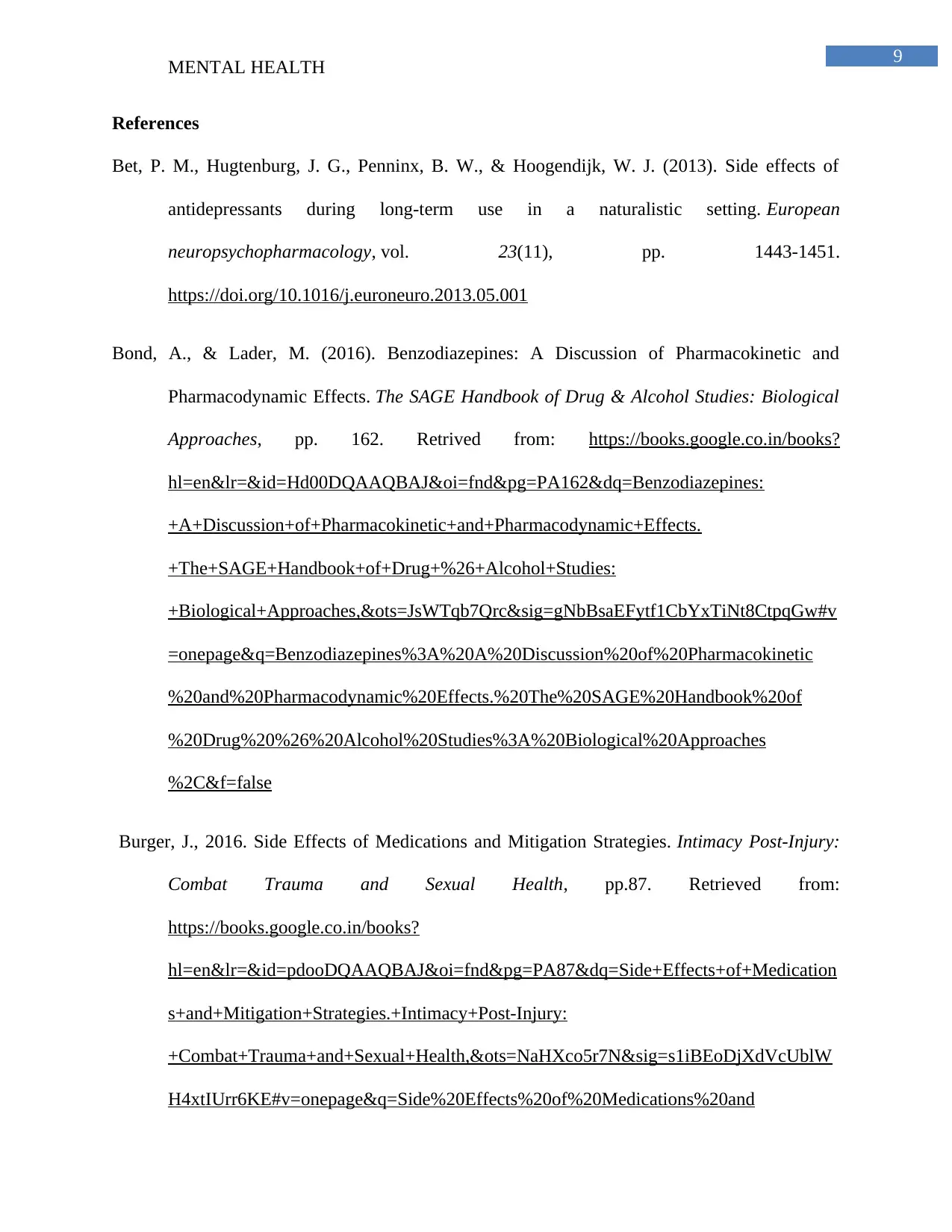
9
MENTAL HEALTH
References
Bet, P. M., Hugtenburg, J. G., Penninx, B. W., & Hoogendijk, W. J. (2013). Side effects of
antidepressants during long-term use in a naturalistic setting. European
neuropsychopharmacology, vol. 23(11), pp. 1443-1451.
https://doi.org/10.1016/j.euroneuro.2013.05.001
Bond, A., & Lader, M. (2016). Benzodiazepines: A Discussion of Pharmacokinetic and
Pharmacodynamic Effects. The SAGE Handbook of Drug & Alcohol Studies: Biological
Approaches, pp. 162. Retrived from: https://books.google.co.in/books?
hl=en&lr=&id=Hd00DQAAQBAJ&oi=fnd&pg=PA162&dq=Benzodiazepines:
+A+Discussion+of+Pharmacokinetic+and+Pharmacodynamic+Effects.
+The+SAGE+Handbook+of+Drug+%26+Alcohol+Studies:
+Biological+Approaches,&ots=JsWTqb7Qrc&sig=gNbBsaEFytf1CbYxTiNt8CtpqGw#v
=onepage&q=Benzodiazepines%3A%20A%20Discussion%20of%20Pharmacokinetic
%20and%20Pharmacodynamic%20Effects.%20The%20SAGE%20Handbook%20of
%20Drug%20%26%20Alcohol%20Studies%3A%20Biological%20Approaches
%2C&f=false
Burger, J., 2016. Side Effects of Medications and Mitigation Strategies. Intimacy Post-Injury:
Combat Trauma and Sexual Health, pp.87. Retrieved from:
https://books.google.co.in/books?
hl=en&lr=&id=pdooDQAAQBAJ&oi=fnd&pg=PA87&dq=Side+Effects+of+Medication
s+and+Mitigation+Strategies.+Intimacy+Post-Injury:
+Combat+Trauma+and+Sexual+Health,&ots=NaHXco5r7N&sig=s1iBEoDjXdVcUblW
H4xtIUrr6KE#v=onepage&q=Side%20Effects%20of%20Medications%20and
MENTAL HEALTH
References
Bet, P. M., Hugtenburg, J. G., Penninx, B. W., & Hoogendijk, W. J. (2013). Side effects of
antidepressants during long-term use in a naturalistic setting. European
neuropsychopharmacology, vol. 23(11), pp. 1443-1451.
https://doi.org/10.1016/j.euroneuro.2013.05.001
Bond, A., & Lader, M. (2016). Benzodiazepines: A Discussion of Pharmacokinetic and
Pharmacodynamic Effects. The SAGE Handbook of Drug & Alcohol Studies: Biological
Approaches, pp. 162. Retrived from: https://books.google.co.in/books?
hl=en&lr=&id=Hd00DQAAQBAJ&oi=fnd&pg=PA162&dq=Benzodiazepines:
+A+Discussion+of+Pharmacokinetic+and+Pharmacodynamic+Effects.
+The+SAGE+Handbook+of+Drug+%26+Alcohol+Studies:
+Biological+Approaches,&ots=JsWTqb7Qrc&sig=gNbBsaEFytf1CbYxTiNt8CtpqGw#v
=onepage&q=Benzodiazepines%3A%20A%20Discussion%20of%20Pharmacokinetic
%20and%20Pharmacodynamic%20Effects.%20The%20SAGE%20Handbook%20of
%20Drug%20%26%20Alcohol%20Studies%3A%20Biological%20Approaches
%2C&f=false
Burger, J., 2016. Side Effects of Medications and Mitigation Strategies. Intimacy Post-Injury:
Combat Trauma and Sexual Health, pp.87. Retrieved from:
https://books.google.co.in/books?
hl=en&lr=&id=pdooDQAAQBAJ&oi=fnd&pg=PA87&dq=Side+Effects+of+Medication
s+and+Mitigation+Strategies.+Intimacy+Post-Injury:
+Combat+Trauma+and+Sexual+Health,&ots=NaHXco5r7N&sig=s1iBEoDjXdVcUblW
H4xtIUrr6KE#v=onepage&q=Side%20Effects%20of%20Medications%20and
Paraphrase This Document
Need a fresh take? Get an instant paraphrase of this document with our AI Paraphraser
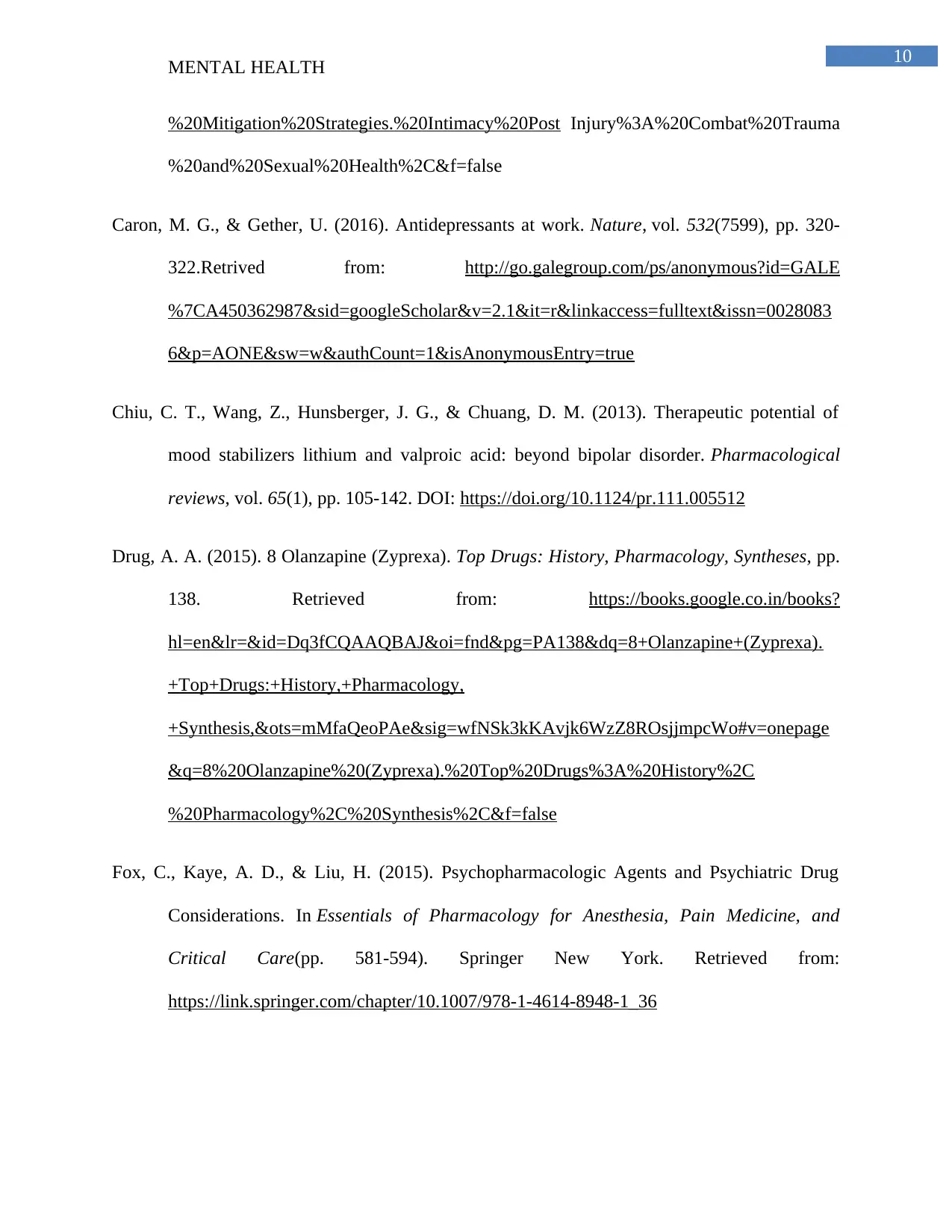
10
MENTAL HEALTH
%20Mitigation%20Strategies.%20Intimacy%20Post Injury%3A%20Combat%20Trauma
%20and%20Sexual%20Health%2C&f=false
Caron, M. G., & Gether, U. (2016). Antidepressants at work. Nature, vol. 532(7599), pp. 320-
322.Retrived from: http://go.galegroup.com/ps/anonymous?id=GALE
%7CA450362987&sid=googleScholar&v=2.1&it=r&linkaccess=fulltext&issn=0028083
6&p=AONE&sw=w&authCount=1&isAnonymousEntry=true
Chiu, C. T., Wang, Z., Hunsberger, J. G., & Chuang, D. M. (2013). Therapeutic potential of
mood stabilizers lithium and valproic acid: beyond bipolar disorder. Pharmacological
reviews, vol. 65(1), pp. 105-142. DOI: https://doi.org/10.1124/pr.111.005512
Drug, A. A. (2015). 8 Olanzapine (Zyprexa). Top Drugs: History, Pharmacology, Syntheses, pp.
138. Retrieved from: https://books.google.co.in/books?
hl=en&lr=&id=Dq3fCQAAQBAJ&oi=fnd&pg=PA138&dq=8+Olanzapine+(Zyprexa).
+Top+Drugs:+History,+Pharmacology,
+Synthesis,&ots=mMfaQeoPAe&sig=wfNSk3kKAvjk6WzZ8ROsjjmpcWo#v=onepage
&q=8%20Olanzapine%20(Zyprexa).%20Top%20Drugs%3A%20History%2C
%20Pharmacology%2C%20Synthesis%2C&f=false
Fox, C., Kaye, A. D., & Liu, H. (2015). Psychopharmacologic Agents and Psychiatric Drug
Considerations. In Essentials of Pharmacology for Anesthesia, Pain Medicine, and
Critical Care(pp. 581-594). Springer New York. Retrieved from:
https://link.springer.com/chapter/10.1007/978-1-4614-8948-1_36
MENTAL HEALTH
%20Mitigation%20Strategies.%20Intimacy%20Post Injury%3A%20Combat%20Trauma
%20and%20Sexual%20Health%2C&f=false
Caron, M. G., & Gether, U. (2016). Antidepressants at work. Nature, vol. 532(7599), pp. 320-
322.Retrived from: http://go.galegroup.com/ps/anonymous?id=GALE
%7CA450362987&sid=googleScholar&v=2.1&it=r&linkaccess=fulltext&issn=0028083
6&p=AONE&sw=w&authCount=1&isAnonymousEntry=true
Chiu, C. T., Wang, Z., Hunsberger, J. G., & Chuang, D. M. (2013). Therapeutic potential of
mood stabilizers lithium and valproic acid: beyond bipolar disorder. Pharmacological
reviews, vol. 65(1), pp. 105-142. DOI: https://doi.org/10.1124/pr.111.005512
Drug, A. A. (2015). 8 Olanzapine (Zyprexa). Top Drugs: History, Pharmacology, Syntheses, pp.
138. Retrieved from: https://books.google.co.in/books?
hl=en&lr=&id=Dq3fCQAAQBAJ&oi=fnd&pg=PA138&dq=8+Olanzapine+(Zyprexa).
+Top+Drugs:+History,+Pharmacology,
+Synthesis,&ots=mMfaQeoPAe&sig=wfNSk3kKAvjk6WzZ8ROsjjmpcWo#v=onepage
&q=8%20Olanzapine%20(Zyprexa).%20Top%20Drugs%3A%20History%2C
%20Pharmacology%2C%20Synthesis%2C&f=false
Fox, C., Kaye, A. D., & Liu, H. (2015). Psychopharmacologic Agents and Psychiatric Drug
Considerations. In Essentials of Pharmacology for Anesthesia, Pain Medicine, and
Critical Care(pp. 581-594). Springer New York. Retrieved from:
https://link.springer.com/chapter/10.1007/978-1-4614-8948-1_36
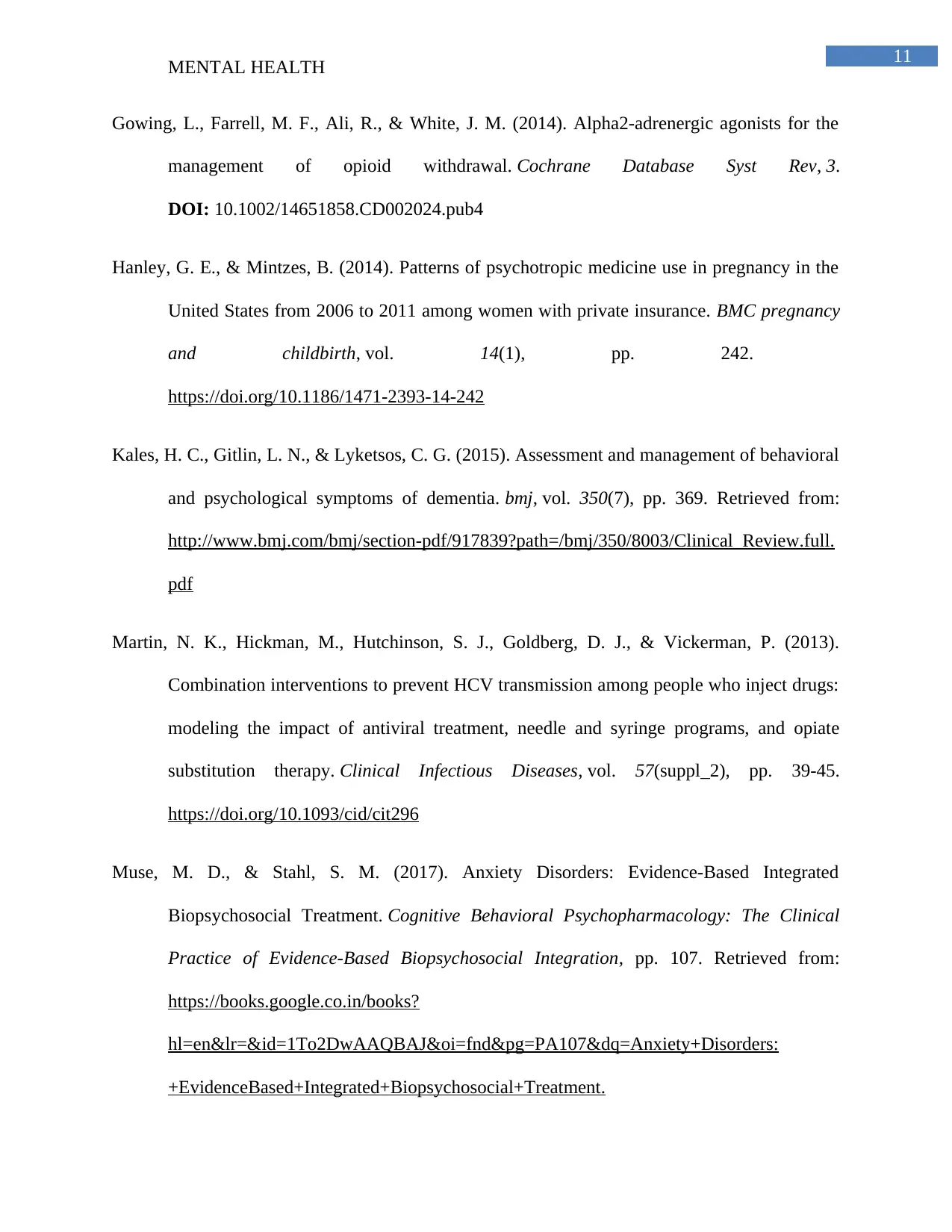
11
MENTAL HEALTH
Gowing, L., Farrell, M. F., Ali, R., & White, J. M. (2014). Alpha2-adrenergic agonists for the
management of opioid withdrawal. Cochrane Database Syst Rev, 3.
DOI: 10.1002/14651858.CD002024.pub4
Hanley, G. E., & Mintzes, B. (2014). Patterns of psychotropic medicine use in pregnancy in the
United States from 2006 to 2011 among women with private insurance. BMC pregnancy
and childbirth, vol. 14(1), pp. 242.
https://doi.org/10.1186/1471-2393-14-242
Kales, H. C., Gitlin, L. N., & Lyketsos, C. G. (2015). Assessment and management of behavioral
and psychological symptoms of dementia. bmj, vol. 350(7), pp. 369. Retrieved from:
http://www.bmj.com/bmj/section-pdf/917839?path=/bmj/350/8003/Clinical_Review.full.
pdf
Martin, N. K., Hickman, M., Hutchinson, S. J., Goldberg, D. J., & Vickerman, P. (2013).
Combination interventions to prevent HCV transmission among people who inject drugs:
modeling the impact of antiviral treatment, needle and syringe programs, and opiate
substitution therapy. Clinical Infectious Diseases, vol. 57(suppl_2), pp. 39-45.
https://doi.org/10.1093/cid/cit296
Muse, M. D., & Stahl, S. M. (2017). Anxiety Disorders: Evidence-Based Integrated
Biopsychosocial Treatment. Cognitive Behavioral Psychopharmacology: The Clinical
Practice of Evidence-Based Biopsychosocial Integration, pp. 107. Retrieved from:
https://books.google.co.in/books?
hl=en&lr=&id=1To2DwAAQBAJ&oi=fnd&pg=PA107&dq=Anxiety+Disorders:
+EvidenceBased+Integrated+Biopsychosocial+Treatment.
MENTAL HEALTH
Gowing, L., Farrell, M. F., Ali, R., & White, J. M. (2014). Alpha2-adrenergic agonists for the
management of opioid withdrawal. Cochrane Database Syst Rev, 3.
DOI: 10.1002/14651858.CD002024.pub4
Hanley, G. E., & Mintzes, B. (2014). Patterns of psychotropic medicine use in pregnancy in the
United States from 2006 to 2011 among women with private insurance. BMC pregnancy
and childbirth, vol. 14(1), pp. 242.
https://doi.org/10.1186/1471-2393-14-242
Kales, H. C., Gitlin, L. N., & Lyketsos, C. G. (2015). Assessment and management of behavioral
and psychological symptoms of dementia. bmj, vol. 350(7), pp. 369. Retrieved from:
http://www.bmj.com/bmj/section-pdf/917839?path=/bmj/350/8003/Clinical_Review.full.
Martin, N. K., Hickman, M., Hutchinson, S. J., Goldberg, D. J., & Vickerman, P. (2013).
Combination interventions to prevent HCV transmission among people who inject drugs:
modeling the impact of antiviral treatment, needle and syringe programs, and opiate
substitution therapy. Clinical Infectious Diseases, vol. 57(suppl_2), pp. 39-45.
https://doi.org/10.1093/cid/cit296
Muse, M. D., & Stahl, S. M. (2017). Anxiety Disorders: Evidence-Based Integrated
Biopsychosocial Treatment. Cognitive Behavioral Psychopharmacology: The Clinical
Practice of Evidence-Based Biopsychosocial Integration, pp. 107. Retrieved from:
https://books.google.co.in/books?
hl=en&lr=&id=1To2DwAAQBAJ&oi=fnd&pg=PA107&dq=Anxiety+Disorders:
+EvidenceBased+Integrated+Biopsychosocial+Treatment.
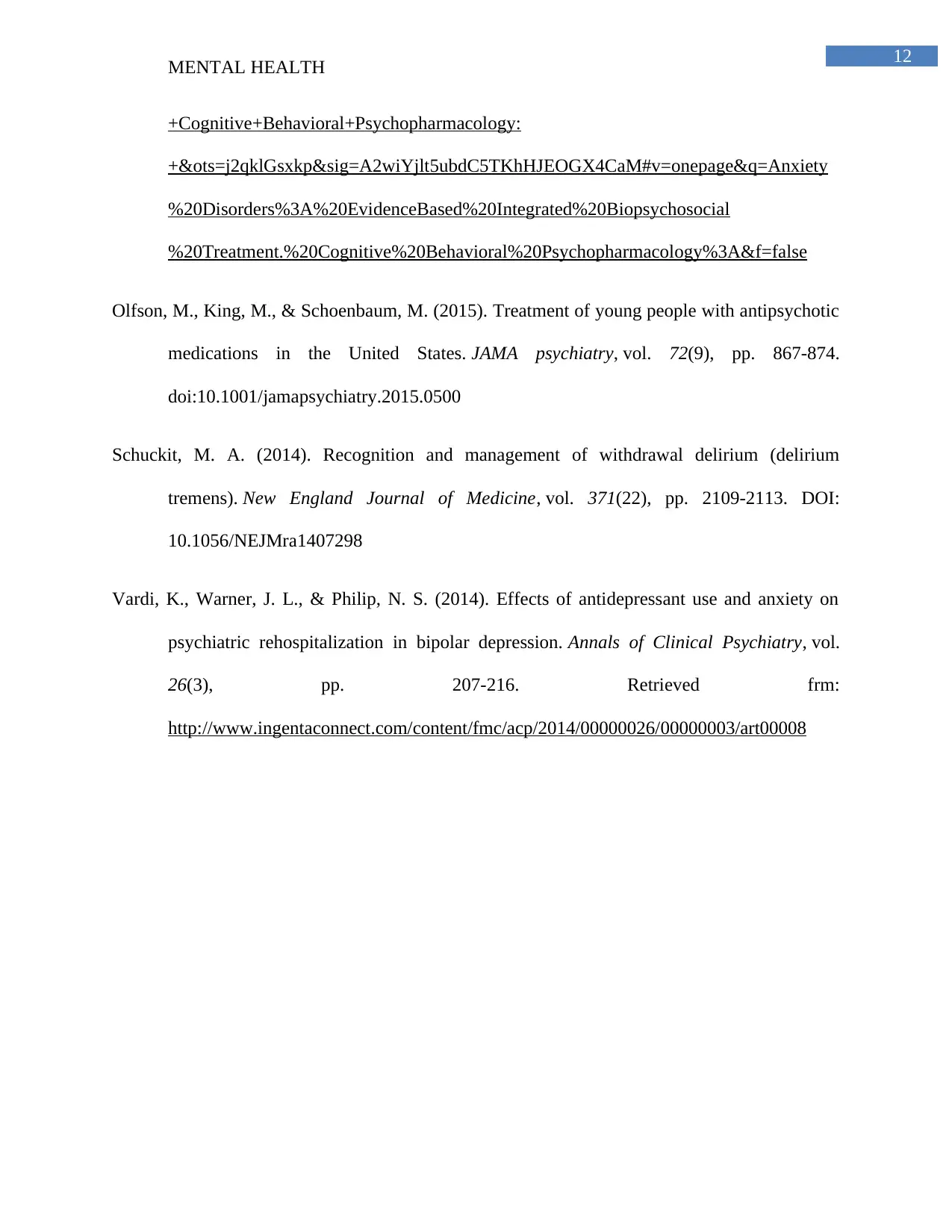
12
MENTAL HEALTH
+Cognitive+Behavioral+Psychopharmacology:
+&ots=j2qklGsxkp&sig=A2wiYjlt5ubdC5TKhHJEOGX4CaM#v=onepage&q=Anxiety
%20Disorders%3A%20EvidenceBased%20Integrated%20Biopsychosocial
%20Treatment.%20Cognitive%20Behavioral%20Psychopharmacology%3A&f=false
Olfson, M., King, M., & Schoenbaum, M. (2015). Treatment of young people with antipsychotic
medications in the United States. JAMA psychiatry, vol. 72(9), pp. 867-874.
doi:10.1001/jamapsychiatry.2015.0500
Schuckit, M. A. (2014). Recognition and management of withdrawal delirium (delirium
tremens). New England Journal of Medicine, vol. 371(22), pp. 2109-2113. DOI:
10.1056/NEJMra1407298
Vardi, K., Warner, J. L., & Philip, N. S. (2014). Effects of antidepressant use and anxiety on
psychiatric rehospitalization in bipolar depression. Annals of Clinical Psychiatry, vol.
26(3), pp. 207-216. Retrieved frm:
http://www.ingentaconnect.com/content/fmc/acp/2014/00000026/00000003/art00008
MENTAL HEALTH
+Cognitive+Behavioral+Psychopharmacology:
+&ots=j2qklGsxkp&sig=A2wiYjlt5ubdC5TKhHJEOGX4CaM#v=onepage&q=Anxiety
%20Disorders%3A%20EvidenceBased%20Integrated%20Biopsychosocial
%20Treatment.%20Cognitive%20Behavioral%20Psychopharmacology%3A&f=false
Olfson, M., King, M., & Schoenbaum, M. (2015). Treatment of young people with antipsychotic
medications in the United States. JAMA psychiatry, vol. 72(9), pp. 867-874.
doi:10.1001/jamapsychiatry.2015.0500
Schuckit, M. A. (2014). Recognition and management of withdrawal delirium (delirium
tremens). New England Journal of Medicine, vol. 371(22), pp. 2109-2113. DOI:
10.1056/NEJMra1407298
Vardi, K., Warner, J. L., & Philip, N. S. (2014). Effects of antidepressant use and anxiety on
psychiatric rehospitalization in bipolar depression. Annals of Clinical Psychiatry, vol.
26(3), pp. 207-216. Retrieved frm:
http://www.ingentaconnect.com/content/fmc/acp/2014/00000026/00000003/art00008
1 out of 13
Related Documents
Your All-in-One AI-Powered Toolkit for Academic Success.
+13062052269
info@desklib.com
Available 24*7 on WhatsApp / Email
![[object Object]](/_next/static/media/star-bottom.7253800d.svg)
Unlock your academic potential
© 2024 | Zucol Services PVT LTD | All rights reserved.





